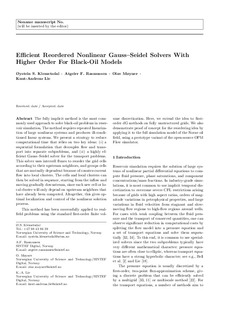Efficient reordered nonlinear Gauss–Seidel solvers with higher order for black-oil models
Journal article, Peer reviewed
Accepted version

View/
Date
2019Metadata
Show full item recordCollections
- Institutt for matematiske fag [2474]
- Publikasjoner fra CRIStin - NTNU [38289]
Abstract
The fully implicit method is the most commonly used approach to solve black-oil problems in reservoir simulation. The method requires repeated linearization of large nonlinear systems and produces ill-conditioned linear systems. We present a strategy to reduce computational time that relies on two key ideas: (i) a sequential formulation that decouples flow and transport into separate subproblems, and (ii) a highly efficient Gauss–Seidel solver for the transport problems. This solver uses intercell fluxes to reorder the grid cells according to their upstream neighbors, and groups cells that are mutually dependent because of counter-current flow into local clusters. The cells and local clusters can then be solved in sequence,starting from the inflow and moving gradually downstream, since each new cell or local cluster will only depend on upstream neighbors that have already been computed. Altogether, this gives optimal localization and control of the nonlinear solution process. This method has been successfully applied to real-field problems using the standard first-order finite volume discretization. Here, we extend the idea to first-order dG methods on fully unstructured grids. We also demonstrate proof of concept for the reordering idea by applying it to the full simulation model of the Norne oil field, using a prototype variant of the open-source OPM Flow simulator.